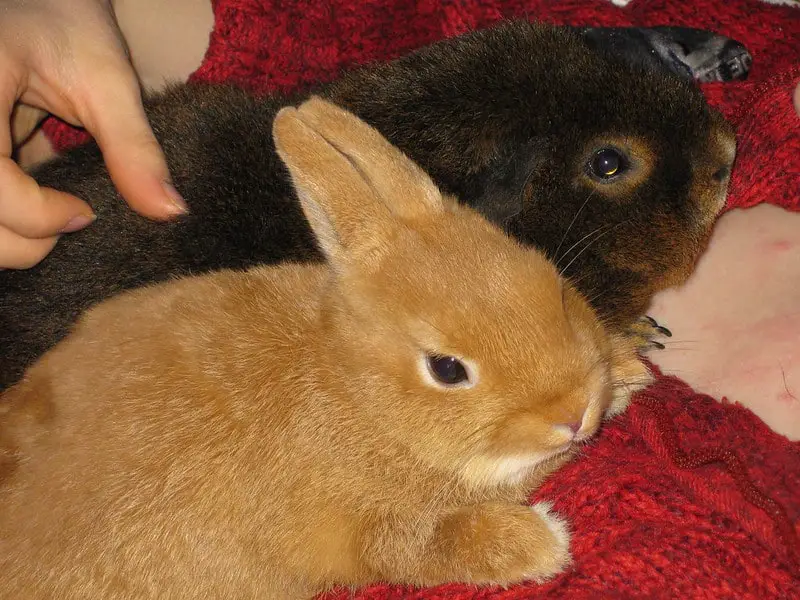Choosing the right pet can be a daunting task. With so many options available, it can be difficult to decide which one is right for you. Two popular options for small pets are guinea pigs and rabbits. Both are adorable, fluffy, and fun animals to have in your home.
But which one makes a better pet? In this article, we will explore the differences between guinea pigs and rabbits and help you make an informed decision.
Guinea pigs and rabbits have been kept as pets for centuries. The Incas of Peru domesticated guinea pigs over 3,000 years ago, while rabbits have been kept as pets since ancient Rome. Since then, both animals have become popular pets around the world.

Physical Characteristics
Guinea pigs and rabbits have distinct physical differences. Guinea pigs are generally smaller and weigh between 1-3 pounds. They have short, stocky legs and round bodies. Rabbits are larger and can weigh anywhere from 2-20 pounds depending on the breed. They have long, powerful hind legs and a leaner body.
One unique feature of guinea pigs is their “cavy flop.” When they are happy and feel safe, they will flop onto their side, exposing their belly. Rabbits, on the other hand, have a distinctive hop and can jump up to three feet in the air.
These physical differences affect their care and maintenance. Guinea pigs need a cage that is at least 7.5 square feet, while rabbits require at least 12 square feet. Guinea pigs also need a solid floor to prevent injuries to their delicate feet, while rabbits require a wire floor to prevent digging.
Temperament and Personality
Guinea pigs and rabbits have unique behavioral traits. Guinea pigs are social animals and enjoy the company of other guinea pigs. They are also very vocal and will make a variety of sounds to communicate with their owners. Rabbits, on the other hand, can be more independent and are not always as vocal. They enjoy being pet and scratched behind the ears, but may not enjoy being held for long periods of time.
Both guinea pigs and rabbits can be trained to use a litter box, but guinea pigs tend to be easier to train. They are also less likely to bite or scratch, making them a better choice for families with young children.
Care and Maintenance
Guinea pigs and rabbits have specific housing requirements. Guinea pigs need a cage that is large enough for them to move around, as well as a hiding place and toys to keep them mentally stimulated. They also require a diet high in hay, fresh vegetables, and a small amount of pellets. Rabbits need a similar diet, but also require access to fresh water at all times.
Both guinea pigs and rabbits need regular grooming to prevent matting and skin problems. Guinea pigs need to have their nails trimmed regularly, while rabbits may require regular brushing to prevent hairballs.
Both animals also need exercise and playtime outside of their cages. Guinea pigs enjoy running and playing in a large, enclosed area, while rabbits enjoy hopping and exploring.
Health and Wellness
Guinea pigs and rabbits are prone to different health issues. Guinea pigs are prone to respiratory and dental problems, while rabbits are prone to digestive issues and dental problems. Both animals require regular veterinary care, including vaccinations and checkups.
Guinea pigs have a lifespan of around 4-8 years, while rabbits can live up to 10 years or more. As they age, both animals may require additional care to keep them healthy and comfortable.
Bonding with Your Pet
Building a strong bond with your pet is important for both guinea pigs and rabbits. Spend time with your pet every day, talking to them and gently petting them. You can also train your pet to do tricks, like jumping through a hoop or running through a tunnel.
A close bond with your pet can have many benefits, including reducing stress and improving your overall mood.
Costs and Expenses
The cost of owning a guinea pig or a rabbit can vary depending on where you live and the breed of the animal. The initial purchase price for a guinea pig is typically between $20-$50, while rabbits can cost anywhere from $20-$100 or more. Ongoing expenses for food, housing, and veterinary care can also add up over time.
Conclusion
So, which one makes a better pet: guinea pigs or rabbits? The answer depends on your lifestyle and preferences. Guinea pigs are social, easy to care for, and have a long lifespan. Rabbits are more independent and require more space, but can also be very affectionate.
Ultimately, the decision to get a guinea pig or a rabbit should be made carefully and with consideration for your lifestyle and budget. With the right care and attention, either animal can make a wonderful addition to your family.
- How Long Do American Eskimo Dogs Live? Important Factors and Care Tips - September 29, 2023
- Do American Bulldogs Need Grooming? Essential Tips and Care Guidelines - September 29, 2023
- Do Bengal Cats Enjoy Playing? Essential Tips for Keeping Them Active - September 29, 2023